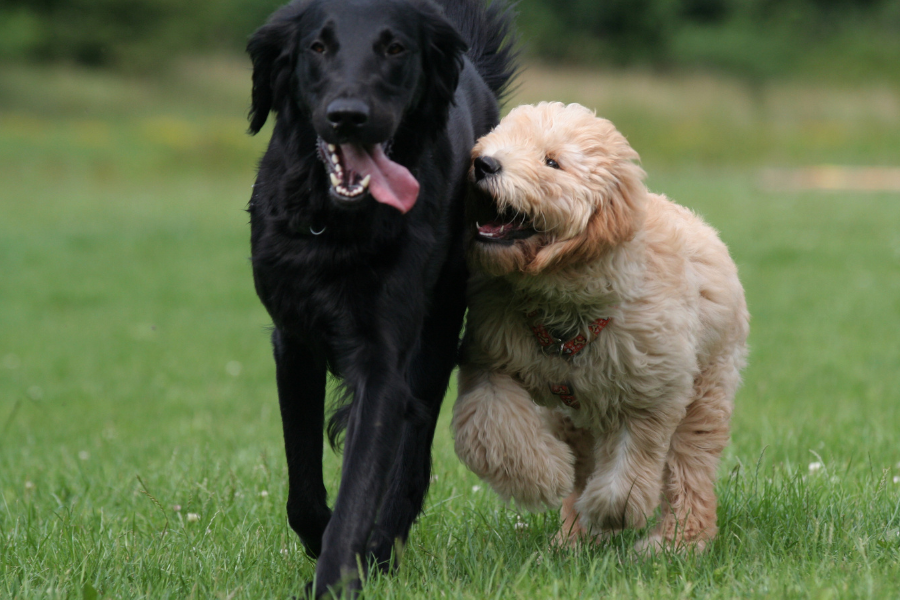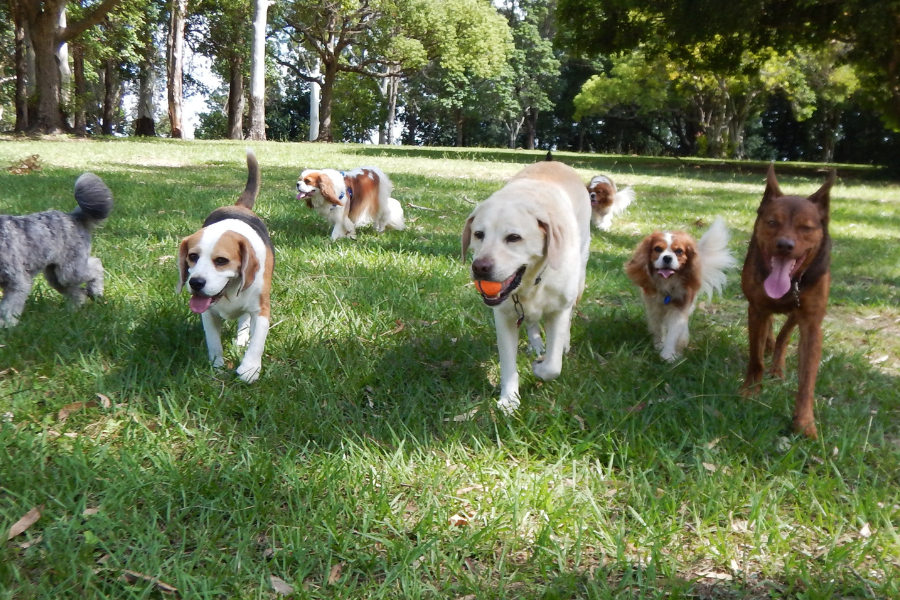In the galaxy of doggo adventures, turning your four-pawed companion into a social butterfly is akin to the ultimate quest. In a world where sniffing butts isn't just accepted, but celebrated as the height of politeness. Ah, to live in a dog's world! But before we dive into wagging tails and play barks, let's get down to the nuts and bolts (AKA the real kibble and bits) of how best to approach dog socialization. In this article we will learn how to sprinkle some social fairy dust onto our furry friends, so they can get along with dogs of all types.
Key Takeaways
- Sniffing Out the Right Friends: Just like a knight seeking allies in a fairy tale, choosing your dog's playmates wisely is important. Your dog probably won't get along with every single dog in the park, and that is A-okay!
- Gentle Meetings: approaching new encounters slowly is a good way to go. Like the grace of a ballroom dance, allowing your dog to do some polite sniffs and soft tail wagging, which can organically set the stage for friendship to be established.
- Fairy Dust Training Sessions: Incorporate socialization into your daily walks as if sprinkling fairy dust along your path. Short, sweet, and filled with enchanting experiences.
- Patience is a Virtue, Not a Command: Remember, every social butterfly was once a caterpillar. Be patient and kind, for transformation takes time and gentle encouragement.
- Celebrate the Small Victories: Every wag, every friendly sniff, and every successful playdate is a tale worth telling. Celebrate these milestones with joy and perhaps a treat or two.
The First Woof: Why Socializing Your Dog is the Bee's Knees
Imagine stepping into a party where everyone speaks a language you don't understand. Everyone seems to know the dance moves except you (this is literally a fear, and recurring nightmare of mine). That is what the world can feel like for someone (including your dog) new to socializing, before they good at it, that is. Socializing your pooch is all about helping them learn the ropes, the lingo of human and doggy manners, if you will. This will hopefully result in encounters that are less fearful, and more joyful!
Paws and Reflect: The Puppy Phase
If you have a puppy and are reading this blog, you have an advantage. The raw-doggy truth of the matter is that the best time to start socializing a dog is when they are young - and the younger the better. Puppies, like human babies, are like sponges that absorb everything they are exposed to (both good and bad). Dogs often learn and ingrain habits at a young age.
It is a good idea to begin in a controlled environment where your pupper can meet new friends—both human and canine—in a safe, positive way. Puppy classes are like the rom-com meet-cutes of the dog world, perfect for making first buddies.
Variety is the spice of live. Try exposing your fluffer nutter to all sorts of wonders—from the cacophony of city streets to the tranquil treasures of a park. Every new sound, sight, and smell builds their confidence like bricks in a castle wall.
Dealing with the Doggo Dilemmas: Anxiety, Reactivity, and the Golden Oldies
Not all furry friends have the same smooth sailing on their social voyage. Doggos with anxiety, a touch of reactivity, or those in their golden years might find the sea a bit rougher. Fear not! We've got the map to find calmer waters.
The Anxious Adventurers
For the dog that finds the world a tad overwhelming, it's all about baby steps. Create a zen garden of experiences, starting with calm and quiet interactions. Treats? Yes, please! Use them as breadcrumbs leading to positive associations. And remember, patience is not just a virtue but a necessity.
The Reactive Rovers
Reactivity can make socializing feel like navigating a minefield. Training sessions with a profesh (that's professional in cool-speak) can be a game-changer. Keep encounters short and sweet, rewarding chill vibes with treats or praise. Think of it as teaching your doggo to be the James Bond of the dog park—cool, calm, and very suave.
The Splendid Seniors
Old dogs can learn new tricks—especially the art of being social butterflies. The key is to tailor experiences to their comfort level and pace. Senior doggos may appreciate more low-key interactions or smaller, more intimate playdates. Remember, age is just a number, but treats are forever.
Seeking the Guidance of a Fairy God-Trainer
Ah, the tale as old as time: the moment when the enchanting path of socialization introduces a twist, a turn, or perhaps a little hiccup. Fear not, valiant caretaker, for this is simply the universe's way of nudging you towards seeking out a fairy god-trainer. You see, asking for help is not the waving of a white flag, but rather, the unfurling of a grand sail ready to catch the winds of wisdom.
When to Summon the Magic
The signs may be as subtle as a whisper or as loud as a thunderclap. Perhaps your knightly canine still cowers at the sight of a squirrel, or maybe their greetings are more of a joust than a jest. If your attempts at socialization feel more like swimming upstream, it's time to call in the cavalry.
Finding the Merlin of Dog Trainers
Look for a trainer whose toolbox is filled with positivity, whose wand opts for rewards over reprimands. Credentials are the scrolls of authenticity, so seek those with reputable certifications, glowing testimonials, and a heart as big as their handbook of tricks. A true wizard of the canine realm will not only train your pup but will empower you with the knowledge to continue the magic at home.
Remember, every great adventure may require a fellowship. In the quest for canine camaraderie, a good trainer is the Gandalf to your Frodo, guiding you through the murky forests and into the light of socialization success.
The Road to Sociable Snouts
We have covered a lot in this blog! How do you feel? Ready to get out there and start socializing with your pup? We hope you can refer to this blog whenever needed, so you can ground yourself in the basics of dog socialization. Whether you are starting with a blank slate and socializing a puppy, have some challenges with a reactive or anxious pooch, or teaching an old dog some new social tricks, the path to a well-rounded woof-er is paved with consistency, patience, and heaps of love. Celebrate the small victories, learn from the mishaps, and above all, enjoy the ride. After all, every social interaction is another story to add to your shared adventure.
In the whimsical walk of life with your dog, there will be both puddles of mud and showers of joy. Each moment of socialization is a step towards a richer, fuller life for your four-legged pal. So, here's to the late-night parties at the dog park, the curious sniffs in new environments, and the happy dances of meeting a new playmate. In the grand symphony of life, may your dog play the most jubilant of tunes.
References
1) Howell TJ, King T, Bennett PC. Puppy parties and beyond: the role of early age socialization practices on adult dog behavior. Vet Med (Auckl). 2015 Apr 29;6:143-153. doi: 10.2147/VMRR.S62081. PMID: 30101101; PMCID: PMC6067676.



